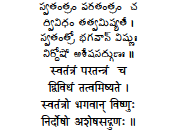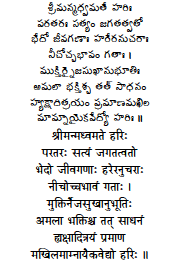Athato Brahma jignyasaa ! ......

Purna pragnya Darsanam- An Elaboration on the Madhvacharya's Dvaita
Purna Pragnya is one school of Philosophy which is easy ( relatively !!) to understand and probably easy to relate to !!
It is the one which propounds Dvaita, the two separate entities Paramatma (Hari) and Jivaatma (you and me). This is unlike the Advaita.
The Purnapragnya Darsana or Dvaita system of Vedanta is founded by Madhvacharya. The followers of this system are called Madhvas. The Upanishads have texts expounding the difference as well as non- difference between Paramatman and the Jivaatma . It is Madhvacharyaargument that the texts expounding difference are the real teachings. This philosophy arose as a reaction mostly against Advaita whose argumentswere seen to be too difficult for common people.
The principle of Dvaita is stated in the following

The principal realities according to Madhvacharya are only two.
The Independent one (Svatantram) is Vishnu without blemish and with inexhaustible excellences or capabilities!!
The dependent ones ( paratantram ) being all the rest of us !!
So it is Hari and Hari alone who is the master of everything
Madhvacharya identified Brahman as Vishnu (or Narayana ), the principle deity of Hinduism. Though in the normal sense Hindus pray to the triumvirate of Brahma, Vishnu and Maheswara – it is Vishnu who occupies the central position. As per Madhvas or the followers of Madhvacharya,Dvaita represents a combination of Vaishnava cult in the Hindu religion with Upanishadic flavor. Devotion to Vishnu occupies the central focus in Dvaita.
So what are the prescribed methods of Seva?

The methods of Seva are three namely
-Ankanam.. narayanasya ayudhadinaam -
-Naamakaranam kesavaadi naamnaa -
-Bhajanam Dasavidham
Ankanam is painting oneself with the weapons of Narayana namely the discus and Conch. Discus on the right hand and conch shell on his left hand.
Namakaranam ( of children) is for the purpose of continuous reminder of the Hari . You name your children with Kesava etc.
Bhajanam is ten types
Madhvacharya also defined means of validating knowledge. He used the same to establish the primary principle of Dvaita. To get a taste of the trenchant logic used by these we need to go through only one statement.
Consider the Statement that the world is false.
If the Statement is True then the whole Dvaita falls. Since we believe in Dvaita the statement has to be false. Of course this is a false Logic. It is like answering the question Is the transitoriness permanent or transitory. There is a difficulty in either case. The proof of the “permanence of the transitory” as both permanent and transitory is something of a delight only to logicians.
In fact there is a one Sloka which neatly summarizes the whole philosophy. That is as follows :

It is a philosophy with virtual ten commandments . The first one is,-
![]()
Hari alone is supreme.
It is like saying “Hari sharanam" It is the experience of one and all that there is some unseen force behind this existence maintenance and other activities of the world. That unseen force is Lord Vishnu. He is the controller of all our destinies and becomes the object of worship.
![]()
This world is real .
This recognizes the reality of the world as is !!
On the basis of valid means of knowledge namely such as Perception Madhvacharya accepts that this world with its experiences as real. According to Madhvaharya even Srutis are to be interpreted based on perception only. According to him anything real even for a moment ( of time) is real enough . To be real it need not be eternal or time invariant. There is no Maya as asserted by Advaitins !
![]()
The "Difference" is Fundamental. The difference between Paramatma ( Lord) and Jivaatma (our self) ; Jivaatma and Jivaatma , meaning that one self is different from another ; Jivaatma and inanimate objects; Paramatma and inanimate objects , and differences among inanimate objects. This five fold difference is fundamental. This is based on the perceived reality.
![]()
The Souls are dependent on Hari ( Vishnu).The Souls are different from inanimate matter. Souls are dependent on the Paramatma for their existence activity and liberation. (Kathopanishad also states the same)
![]()
The Souls are graded higher and lower based on preponderance of the three Gunas “Satva” “Rajas” and “Tamas”. For those dominated by “Satva”, it is in their nature to do good. They are fit for liberation. The spiritually inclined fall into this category. For those dominated by “Rajas”, they are neither fully good nor bad. They are not fit for liberation . But they are also not not condemned for suffering. They are forever in the cycle of birth and death. For those dominated by “Tamas”, evil is their nature and they are for ever condemned to suffer. Thus the last two categories namely Rajas and Tamas are not destined for liberation. It also means that philosophy of “everybody getting liberation” is not accepted by Madhvacharya. Concept of everybody getting liberation is more sentimental than real according to Madhvacharya's Dvaita. Even within each category they accept differences (taratamya gradation) and hence the possibility of some getting liberation faster than the other is provided for and explained.
![]()
Liberation is enjoying one's own bliss. The first and foremost fact about Moksha is that it is accepted as the highest object ( Purushartha). For this reason it must be a state of unalloyed bliss. This also means that it presupposes the survival of one who experiences this. Bliss is here !
![]()
Pure devotion is the means to liberation. Liberation can be obtained by the grace of Hari only. This grace of God is obtained by those souls chosen and granted by him. This grace of God is possible only by true devotion. True devotion or True Bhakti is without desires !!. There is no wish list accompanyingdevotion !!
![]()
The perception etc 'the three' , are the means of valid knowledge. The three means of valid knowledge are “Perception”, “Inference” and “Verbal testimony”.
Thus Madhvacharya also defined the basis of acquiring knowledge. All his conclusions are based on these three means of obtaining valid knowledge only . The Srutis form part of verbal knowledge.
![]()
Lord Hari alone is the purport of all scriptures. This is supported by the Krishna's statement in Gita "Vedescha sarvai ahameva Vedyaha”. “I am alone made known by Vedas!!.
Madhvacharya supported each line as above with extensive extracts from the Vedas , Gita and Brahma Sutras !
We cannot close a explanation of Dvaita without touching on the explaination of “tatvamasi”, the statement that gets repeated in the dialog between Uddalaka and Svetaketu : “ Sa Atmaatatvamasi “ – Madhvacharya explains it as “ Sa Atma Atatvamasi “ . "That Atma is not You" – that is Brahman ! This probably is correct explanation using Paninis Grammar. But this may not fit the logic of univerality.
The beauty of all the Indian Schools of Philosophy is that they amke framework of logic and fit every thing into that .
All of them are quite argumentative. All of them define the valid means of affirming knowledge. And all of them base their argument using the same three scriptures – the Vedas, Brahma Sutras and The Gita.
Om tat Sat